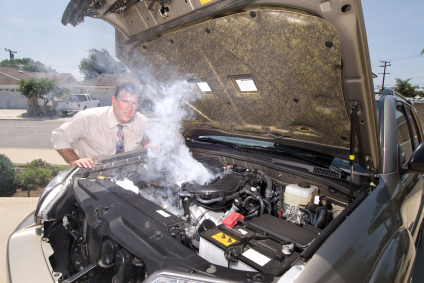
What would we do without a car? Cars are our freedom. They allow us to drive five miles to the store, or 500 miles to a retreat where we can get away from it all.
We are all aware of the many conveniences of having an automobile, and how it makes life so much easier. The time and money saved by owning a car are enormous as opposed to relying on public transportation or carpooling. But along with owning a car comes the responsibility of maintaining it too.
Now that summer is upon us, we must be diligent in having our cars checked before hitting the road for vacations or weekend get aways. One common malfunction with cars during summer months is overheating. There are several reasons why a car overheats, some being very simple and others requiring the knowledge of a trained mechanic. Listed below are five reasons that frequently cause cars to overheat:
1. The car is losing anti-freeze due to a leak in the radiator. Or the radiator is clogged. Either one of the problems results in the engine not getting enough coolant, ending up with an overheated car. Ideally the liquid in the radiator should be a mixture of 50% anti-freeze and 50% water.
2. Loose belts and/or hoses may cause the engine to run hot. Hoses wear out over time and may develop small “pinholes” which cause leaks. Belts should be checked regularly as they can become frayed over time and could possibly break.
3. The radiator cap may need replacement or tightening. Sometimes a very simple solution such as checking the radiator cap is the answer to the problem. The seal on the cap gets brittle and may cause pressure to escape from the radiator.
4. The water pump may need to be replaced. Unless you have a considerable amount of experience in repairing cars, this is an item that is best suited for a mechanic. Today’s cars are extremely complex with computerized parts. A simple scan from the diagnostic tools found in a mechanic’s shop can give you an immediate answer.
5. The radiator is low or completely out of coolant. As we drive our cars, the heat generated can cause evaporation of fluids. It is important to frequently check the coolant level in the radiator, especially during the summer months when running the air conditioner.
With proper maintenance our cars will deliver dependable service and keep us running smoothly throughout the year. Take the time to inspect your vehicle and keep lots of coolant on hand before hitting the road.
